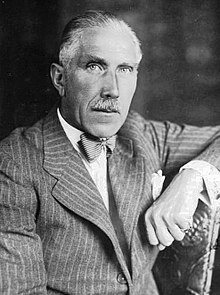Cabinet of Barons
| Franz von Papen | |
|---|---|

Franz von Papen in 1936
|
|
| Chancellor of Germany | |
|
In office 1 June 1932 – 17 November 1932 |
|
| President | Paul von Hindenburg |
| Preceded by | Heinrich Brüning |
| Succeeded by | Kurt von Schleicher |
| Vice-Chancellor of Germany | |
|
In office 30 January 1933 – 7 August 1934 |
|
| Chancellor | Adolf Hitler |
| Preceded by | Hermann R. Dietrich |
| Succeeded by | Hermann Göring (1941) |
| 26th Prime Minister of Prussia (de facto) | |
|
In office 30 January 1933 – 10 April 1933 |
|
| Preceded by | Kurt von Schleicher |
| Succeeded by | Hermann Göring |
|
In office 20 July 1932 – 3 December 1932 |
|
| Preceded by | Otto Braun |
| Succeeded by | Kurt von Schleicher |
| Personal details | |
| Born |
Franz Joseph Hermann Michael Maria von Papen zu Köningen 29 October 1879 Werl, Germany |
| Died | 2 May 1969 (aged 89) Obersasbach, West Germany |
| Resting place | Wallerfangen, Germany |
| Political party |
Zentrum (1918–1932) Independent (1932–1945) |
| Spouse(s) | Martha von Boch-Galhau (m. 1905; her d. 1961) |
| Children | Friedrich Franz Antoinette Margaretha Isabella Stefanie |
| Alma mater | Prussian Military Academy |
| Profession | Diplomat, military officer |
| Military service | |
| Allegiance |
|
| Rank |
Major Military attaché |
| Battles/wars | World War I |
Franz von Papen (German: [ˈfʁants fɔn ˈpaːpən] (![]() listen); 29 October 1879 – 2 May 1969) was a German nobleman, General Staff officer and politician. He served as Chancellor of Germany in 1932 and as Vice-Chancellor under Adolf Hitler in 1933–34. He belonged to the group of close advisers to President Paul von Hindenburg in the late Weimar Republic. It was largely Papen, believing that Hitler could be controlled once he was in the government, who persuaded Hindenburg to appoint Hitler as Chancellor in a cabinet not under Nazi Party domination. However, Papen and his allies were quickly marginalized by Hitler and he left the government after the Night of the Long Knives, during which the Nazis killed some of his confidantes.
listen); 29 October 1879 – 2 May 1969) was a German nobleman, General Staff officer and politician. He served as Chancellor of Germany in 1932 and as Vice-Chancellor under Adolf Hitler in 1933–34. He belonged to the group of close advisers to President Paul von Hindenburg in the late Weimar Republic. It was largely Papen, believing that Hitler could be controlled once he was in the government, who persuaded Hindenburg to appoint Hitler as Chancellor in a cabinet not under Nazi Party domination. However, Papen and his allies were quickly marginalized by Hitler and he left the government after the Night of the Long Knives, during which the Nazis killed some of his confidantes.
Born into a wealthy and noble Roman Catholic family in Werl, Westphalia, the son of Friedrich von Papen zu Köningen (1839–1906) and his wife Anna Laura von Steffens (1852–1939), Papen was trained as an army officer and as a Herrenreiter ("gentleman rider"), a sport that Papen very much enjoyed. Papen was proud that his family had since the 13th century been granted the hereditary right to mine salt at Werl, and he always believed in the superiority of the aristocracy over commoners. An excellent horseman and man of much charm, Papen cut a dashing figure and during this time, made the fateful friendship with Kurt von Schleicher. He had married Martha von Boch-Galhau (1880–1961) on 3 May 1905. Papen's wife was the daughter of a wealthy Saarland industrialist whose dowry made him a very rich man. Fluent in both French and English, Papen traveled widely all over Europe, the Middle East and North America.
...
Wikipedia
